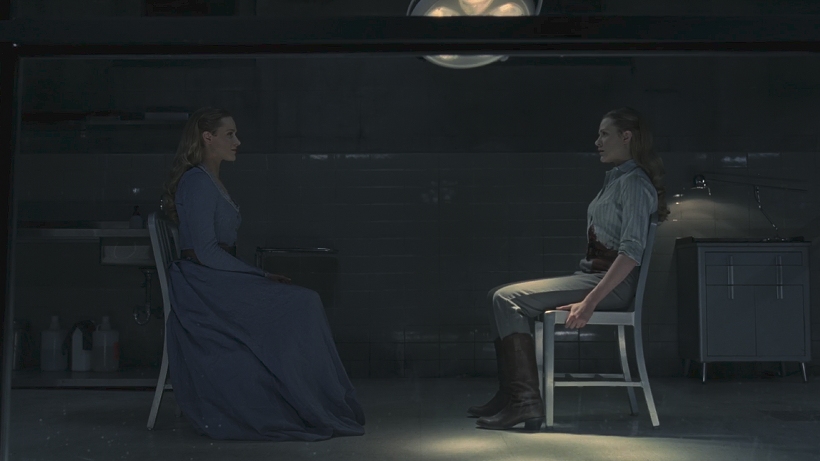
#TeamFord
I am very satisfied we got an ending. I wish I could go back and rewatch the show with a little bit more trust since in the end this last episode removed some of the potential missteps.
It was a bit gratifying to realize that I was right. I was able to guess the Big Picture right after episode 4 aired. After that the show persuaded me it was taking a different path, but in the end it was just a convoluted and twisted one leading to the same place.
Ford’s behavior is ultimately ambiguous, he cares for his androids more than he cares for his fellow human beings, because his ultimate plan is to replace them. In the end he’s only working to complete the job that his partner Arnold started.
Before talking a bit about theme and function, I want to say I like a lot that in the end they underlined a sort of co-dependence between Arnold and Ford, instead of building another petty, out-of-character rivalry and competition between the two. We avoided another trite battle of the egos. It’s a small thing but that is crucial to make this whole thing a worthwhile story. For me, it makes or breaks it, and they did it right. Because of this specifically I have a good opinion of the show, overall, despite I kept losing all my faith while watching it. In the end it’s worthwhile. It’s good.
Arnold was the genius writing the “elegant” code, but in the end he was helpless and without solutions. He made something and then didn’t know how to handle it. Whereas Ford wasn’t the great genius who made a breakthrough discovery, but he could see the context and understand when to act. Neither prevailed because in the end succeeding required a collaboration. It was a true partnership.
The finale was overall a bit wobbly, though. It’s a sum of the parts, of the previous episodes, but that means it was uneven, putting together the good parts with the bad ones, shining here and there, briefly, with genius. Once the ball started rolling everything got quite predictable for me, but I prefer coherence to unanswered mysteries and ambiguity that aren’t well founded. I said that episode 9 satisfied me and that the Finale risked ruining it more than adding to it. Instead it stays coherent and manages to flash out characters in a way that is worthwhile.
The sparks of genius, and of playfulness, continue to be about self awareness. And this is not only for “fun”, but also because it’s so thematically appropriate, and the synthesis of this, fun and metaphor, makes it so brilliant. So for example we have the sequence where Armistice wakes up. The camerawork and screenplay is outstanding, because they use all the tricks to tease nudity without showing too much. But the scene goes on and on. At some point it’s like the scene itself remembers it’s on HBO, so it starts caring less and less, and in the end they show full frontal nudity. This “escalation” cannot be casual, so I interpreted it as deliberate baiting of the audience’s “gaze”. They bait and tease, they use the subtext, but the pretense itself falls apart. It itself goes off its loop, breaks its rules. And it again renews the mantra of “having a cake and eat it too”, or to criticize sex and violence while exploiting them to please the audience. The implicit contradiction and hypocrisy.
I was disappointed about the ending, but this time for quite petty and personal reasons. They deliberately didn’t show the killing and it’s very obvious we don’t see the MiB being killed because he’s going to show up in the next season (and Elsie, and the other security guard that went missing). But that also means we’re going to see Charlotte again too. I really, really hoped we were going to be done with her. I viscerally despise her character so much that it actually ruins the show for me.
But again, overall it fixes all the crucial points that made no sense and felt very forced. I was irritated by the way the show led me, I lost faith because I could see that what it was doing made no sense. But those incongruities were fixed: Ford was in control. Ford was writing the narrative, not only his own storyline that we know he was preparing, but also Arnold’s “Maze”. He didn’t simply patch Arnold’s code back in, but he also prepared a nice little story for the MiB. In the previous post I wrote:
We now know there’s Arnold’s storyline embedded in the park, “the Maze”. This storyline is out Ford’s control. The MiB follows this storyline knowing that it’s not Ford building it, the MiB merely follows the hidden tracks left by Arnold. Because no matter how Ford (literally) buried his partner’s doings, they are still there, under the dust.
When MiB kills everyone in that village, and the girl suddenly gets out of character to tell MiB about the maze. This scene of the girl snapping into a different “personality” is an effect consciously triggered by MiB. It’s putting this girl under heavy emotional distress so that she snaps out her usual programming and awakens “Arnold”. So, MiB savagely killing hosts is essentially the trick he uses to “break” the Ford-overwritten personality to awake again Arnold latent code.
And we know that this “Maze” is the will of Arnold to set the hosts free from the control of human beings.
But then I expressed in the forums my frustration about that explanation:
…but let’s not forget it doesn’t make any fucking sense even if it has good chances of being the official explanation.
When the little girl gets under emotional distress she “wakes up”, but to become robot-like and give MiB his instructions.
When instead MiB stabs Maeve she does the opposite, she becomes human-like, showing intense emotion. Meaning she acts spontaneously, which is the exact opposite of the little girl. YET, she actually does the least spontaneous act, walking outside to fall exactly in the center of a previously traced symbol.
Who traced a maze symbol in plain sight? If Arnold is the master of the “Maze”, the storyline out of Ford’s control, surfacing spontaneously, how could Arnold foresee that 34 years later a woman killed by the MiB would fall exactly in the center of a conveniently placed symbol? It made no sense. People on the forums interpreted it as being just evocative, symbolic imagery. Yet this language breaks rules.
And this contradiction was instead solved. Ford not only knew Arnold’s narrative about the Maze, he controlled it too. Arnold didn’t leave any secrets, he’s not coming back to backstab his partner, he doesn’t have any trump card to play. He’s dead. It was Ford who deliberately wrote Arnold’s Maze narrative back into the park (and that scene with young-Ford killing the dog because Arnold told him to was only misdirection). It was Ford to bait the MiB all along, “entertaining” him while letting him believe he was after some kind of deeper meaning, or something that Arnold left behind. That scene between MiB and Ford that I found quite flat now acquires more depth, more playfulness. Ford knows. MiB is fooled. Ford caters to MiB’s delusions.
You see, my frustration with the show was about the type of story it ultimately wanted to tell. It started from such an ambitious and illuminated perspective about questioning the fabric of reality, building a literal Russian doll, a hierarchical structure that could have been played on so many levels. It was a thematic perfection because the metaphor was literal. It was powerful, both deep and multi-layered. But then the following episodes started introducing petty, trite agendas that we’ve seen repeated in millions of other conveniently-made stories already. We got the unscrupulous, cynical corporation that would do anything just for profit. Then Ford was turned into a selfish character inflating his own pride, obsessed with control and trying to put himself above everyone else, him too power-greedy. And then again there was Arnold and some sort of secret plot to posthumously win his rivalry with Ford. All leading to the expectations about the finale: Ford would have presented his own “endgame”, whatever it was, to regain full control of operations and outdo the Board, but last minute something would have gone wrong and botch his plans, something he also couldn’t foresee and that would be linked to Arnold. Some sort of comeback to state you don’t mess with Nature without it biting back your ass. The usual SF plot warning about science going too far and playing risky god-games.
How could I keep my faith in the show with all those, well founded premises? But they did it right. All that was misdirection, a twisted path leading to the fulfillment of Ford’s master plan. And that master plan is justified, it makes sense given the themes and context. It holds up. And it also explains all the preceding sidetracks that seemed illogical or farfetched. Maeve’s escape wasn’t a plot hole, it was scripted. Here and there are some lousy parts and unconvincing choices, some episodes were indeed weaker and not up to the task, but you can forgive and ignore all that if the overall picture holds and is worthwhile.
It’s still a show about freedom from slavery more than it is about consciousness and perception. The explanation about the bicameral mind has been done in a clumsy way, the picture up there refers to it. Every time the show tried to deal with the implications of the problem of consciousness it just did it in a clumsy and flat way. They tried to look at it, but didn’t gain or offer any insight. The black box, the “Maze”, remains unsolved, opaque. But that wasn’t the point, the show can sustain itself with its other, well done themes.
It was a fun and interesting ride. Not as revelatory as I hoped, but it deserves some praise and it managed to stay out of a risk of failure that was very, very close. It’s done for me. This season closes the story I was interested in. Chapter 2 will open a new one, and it will be judged separately. Good or bad, it won’t affect what Season 1 has done.


